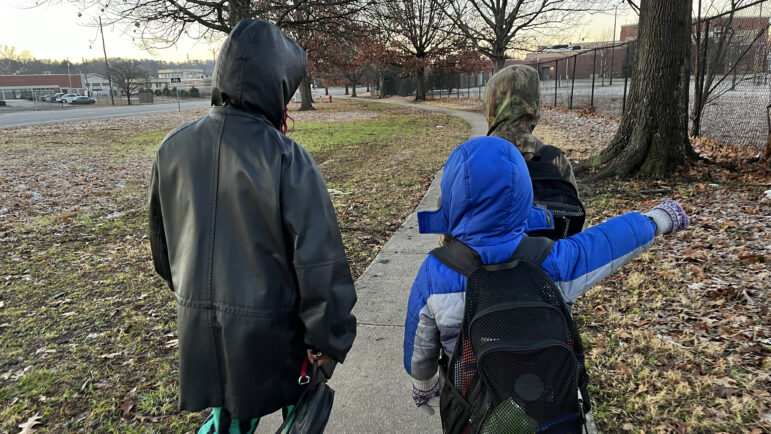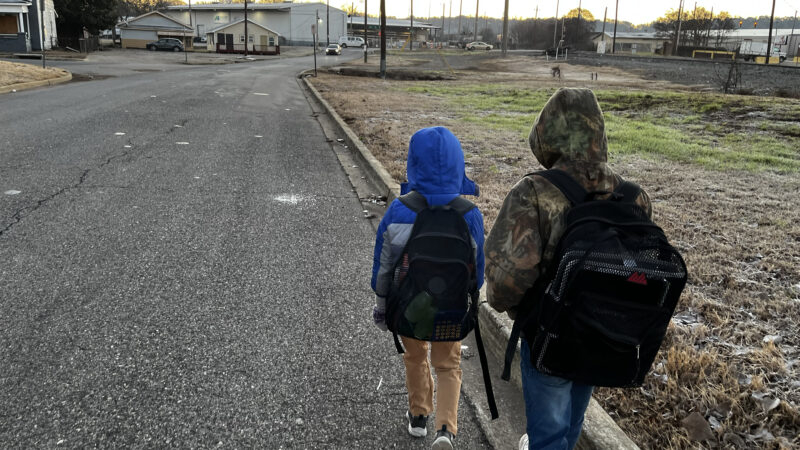Some kids in Birmingham dodge trains and cars walking to school. More buses could help
When it’s time for school, Brittany Taylor’s kids can’t hop on the bus. They have to walk.
On a chilly morning in January, she bundles her kids up in thick coats, hats and gloves before they start their walk on Birmingham’s east side. Her kids Brandon and Kaleb are 10 and 6, respectively. Brandon, a 4th grader, says he looks forward to P.E. It motivates him as he braves the 35-degree weather, which might as well be glacial in Alabama.
“I don’t like when I have to walk. I wish the bus could come to our house — that the bus can come to Kingston,” Brandon said.
A perilous journey
A measure from the Alabama State Department of Education says public schools are only required to pick up students if they are disabled or live outside of a two-mile radius of their zoned school. The Taylor family walks a mile to and from Hayes K-8 School every day. It’s about a 30-minute walk round trip, which might not seem like a lot, but Taylor said it can be risky.
“This is where the 18-wheelers come,” Taylor said. “I always make sure they are on the opposite side of the trucks so that way they won’t get hit.”
Their walk crosses a major highway and train tracks. Sometimes, they have to walk through train cars stalled on the tracks. She said that if she’s lucky she can get someone to give her kids a ride, but it’s rare.
“So it’d be nice if we had a bus that came through this area, picking up all the kids that needs to go to Hayes,” Taylor said. “That will be really nice for every parent.”

Taylor’s able to walk with her kids because she’s a stay-at-home mom, but other parents may not have that flexibility. She said it would also be nice if they had regular crossing guards to help the students walking to school. Most of the kids in her neighborhood walk by themselves.
She sometimes walks with other kids on her way home to make sure they get back safely.
“When I’m out walking and I see a kid, I even hold up traffic myself to try to let them get across,” she said.
Taylor said she has to make hard decisions. When it’s raining too hard, her kids don’t go to school because she worries about them getting sick. When traffic is too busy in the mornings, they take a little longer to walk and it makes them late.
Jerone Wiggins, principal at Hayes K-8, has seen it all.
The need for more buses
“I’ve seen as a teacher, I’ve seen as an administrator, as a coach, I’ve seen kids get hit. I’ve seen kids barely missed by cars,” Wiggins said. “And I’m talking about kids as young as four and five years old walking with siblings really close to their age.”
Wiggins is from the area where Hayes students live. He said he understands the struggles parents may have walking to school because he did it himself.
“We also have parents who, if there is a shooting in their neighborhood the night before, or the threat of a shooting, parents are afraid to let their kids walk to school. So they keep them at home,” Wiggins said.
Since he started as principal last year, Wiggins said the bus issue has been at the top of his list. More buses would solve other problems, like attendance.
“We have been faced with chronic absenteeism for years, and I continue to say …. And I’ll say it until I can’t say it anymore — it’s not 100% the students fault,” Wiggins said. “I think buses or things like that can really, really assist not just the attendance or paperwork here at Hayes, but students getting to school will be safer. I think parents will be comfortable. It’ll eliminate so many challenges that they face just by giving us a couple of buses.”
Wiggins said buses won’t solve everything, but it’s a good start.
A new solution
Hayes K-8 may be getting buses sooner rather than later. Birmingham City Schools is currently assessing potential new bus routes around Hayes, led by the director of transportation Clifford Thomas.
He’s been working with the district for 38 years and he says the safety of students getting to school is his biggest priority, but there are barriers.
“It has been a gigantic task just to attract people who want to drive,” Thomas said. “And they feel like the process takes entirely too long.”
A nationwide bus driver shortage makes a solution even harder to find. The district has held recruitment events to attract more drivers but it hasn’t been that fruitful. In Birmingham, they currently have 125 buses, but only 108 bus drivers.
“The bottom line is what we’re trying to do — we want to accommodate everybody,” Thomas said. “And right now, our main problem, and it’s not going to change any time soon until we get some more drivers. And that’s been our whole enemy. Like I tell anybody, give me the resources, I’ll give you a bus per child. But we are seriously lacking in human capital resources.”
Safety for new routes is an issue too. While the state will allow buses to go within the two-mile cut off if the district can prove there are safety hazards, the buses still might not be able to even get to the neighborhoods where they’re needed. If the streets are too narrow or a new bus stop is too dangerous, then it can’t happen. Still, the district is trying.
Operations officer Donald McCracken said he takes all of the parent requests and complaints seriously. He’s also helping map out new bus routes for schools in Birmingham.
“We see some promising locations — bus stops,” McCracken said. “Once we establish those bus stops in those routes, we will alert the community and alert the state of our desire to work within the two-mile radius in these particular areas simply because of safety.”
The district is starting with the area around Hayes school and plans to add routes at other schools. Once they get approval from the state, the district says they could be up and running as early as this month.
Kyra Miles is a Report for America corps member covering education for WBHM.
40 years after ‘Purple Rain,’ Prince’s band remembers how the movie came together
Before social media, the film Purple Rain gave audiences a peak into Prince’s musical life. Band members say the true genesis of the title song was much less combative than the version presented in the film.
Park Fire in California could continue growing exponentially, Cal Fire officer says
Cal Fire has confirmed that over a hundred structures have been damaged in the Park Fire, which grew overnight near Chico, Calif. Difficult firefighting conditions are forecast through Friday night.
Checking in with Black voters in Georgia about the election, now that Biden is out
Some voters who could be key to deciding who wins Georgia. What do they think about Vice President Harris becoming the frontrunner in the race to be the Democratic nominee?
Tahiti’s waves are a matter of ‘life and death’ for surfing Olympics
Tahiti's Teahupo'o wave has a slew of riders for the Paris 2024 Olympics. NPR finds out why it's called one of the most dangerous waves.
Researchers are revising botanical names to address troubling connotations
Since the mid-1700s, researchers have classified life with scientific names. But some of them have problematic histories and connotations. The botanical community is trying to tackle this issue.
A spectacular opening ceremony wowed a global audience despite Paris’ on-and-off rain
The Paris Olympics opening ceremony wowed Parisians, fans and most everyone who was able to catch a glimpse of thousands of athletes floating down the Seine to officially begin the Games.



